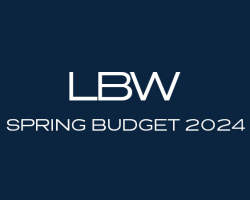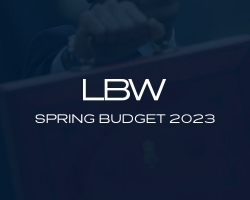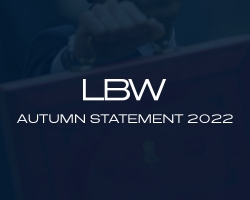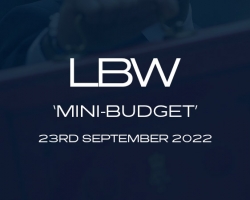Latest News
Video Blog 2 - VAT on business can be a complex area

In the second in our series of video blogs, Tax Director Gary Cullen discusses the complexities of VAT on land and buildings.
My name is Gary Cullen, I am a Chartered accountant and chartered tax advisor working here at LBW Chartered Accountants on the Wirral
My role here at LBW is to interpret tax and VAT law and to apply the rules and regulations to our clients in their day to day transactions.
I particularly enjoy the technical aspect of VAT transactions having had a good grounding in my time working with Grant Thornton in Liverpol.
VAT on Commercial Properties
VAT on Buildings can be quite a complex part of VAT law because the transaction itself can be:
- Standard rated
- Zero rated
- Reduced rated
- Exempt
- Outside the scope of VAT
VAT on the sale of a commercial building can often depend on the use of that building. If a building has for example been opted to tax, then any transactions related to that building be it rented or any subsequent sale will involve VAT being charged.
The purchaser of the building will then be in a position to recover that input VAT if they are carrying out a trading activity and are themselves registered for VAT and making taxable supplies.
If, however, the purchaser intends to let the property then they themselves will need to opt to tax on the building so that they can recover the input VAT they have been charged. But, they must realise that every supply they make in connection with that building be it either rented to a third party tenant or indeed subsequently sold will have VAT attached. Thus they could limit the number of potential tenants they could have in terms of non-VAT registered businesses which are unable to register for VAT because of the nature of their supplies or they trade below the VAT threshold. They would effectively be putting this type of tenant out of their market.
There may well be occasions where the building itself is a business. For example a property that is opted to tax and has been let to tenants. If that rental business is sold and certain conditions apply in so far as the purchaser of the building themselves registers for VAT then the transfer of that property may well be regarded outside the scope of VAT. The advantage this has is that stamp duty land tax is paid on the VAT inclusive value of the property and therefore if there is no VAT attached then there is a potential reduction in the stamp duty land tax. If however the property is neither a business itself or has been opted to tax then any subsequent sale of that property will be an exempt supply. The purchaser has the opportunity on the acquisition of the building to then opt the building to tax for their own purposes in so far as they will be able to reclaim an input VAT on property repairs for example but they then must have consideration for the fact any future supply they make from the property will infact be subject to tax be it either rent or subsequent sale.
One final point to consider with commercial property is the conversion of commercial property into residential property. Construction services supplied in the conversion of the property can benefit from a reduced rate of VAT, currently at 5%. This will only apply to construction services which can include materials provided that they are supplied along with the construction services. The actual purchase of materials by themselves will not benefit from the 5% reduced rate.
VAT on Single Occupancy Properties
The same reduced rate and conditions can also apply to the conversion of a residential property in so far we have a single occupancy property being converted into a multiple occupancy property. Whilst on the question of residential properties, disposal of most residential properties will be exempt of VAT which is why a homeowner when they sell their property although they are making a supply, they are making an exempt supply and are thus not required to register for VAT.
VAT on New Build Properties
All new build residential properties can be sold with a zero rating on VAT. This is not the same as an exempt supply, it is a zero rated supply. The supply of services from subcontractors working on new build residential properties can also be zero rated. The subcontractor will quite clearly identify that they are working on a new build property and they will therefore be eligible to supply their services and associated materials at zero rating. The developer themselves may require materials from the local builders merchants. The builders merchants will have no proof that the work is being carried out on a new build property and would therefore charge standard rate VAT on the supply of materials only. Therefore it is up to the developer to be registered for VAT to reclaim the VAT that is incurred.
One further point regarding a new build property is that if an individual wishes to build their own new build property they can recover the VAT they incur on the materials they buy, by using the DIY house builders scheme. Clearly any subcontractors they employ can likewise see that the work on the property is on a new build and therefore they would be able to charge zero rating VAT on the supplies they make to the house builder. There are certain exceptions including in the items for recovery, normally items you wouldn't usually find in the newly built home, such as appliances.
Summary
We have talked about quite a number of matters relating to property and the various rates of VAT that can apply. It is an area which does require careful planning because whilst I've given a brief outline of the various rates that would apply, there are always exceptions to the general rule and careful review of the legislation is required for each individual circumstance.
Hopefully you have found this brief review of VAT aspects of land and buildings useful and we do have a number of technical tips and advice on our Youtube videos.
Last modified on




